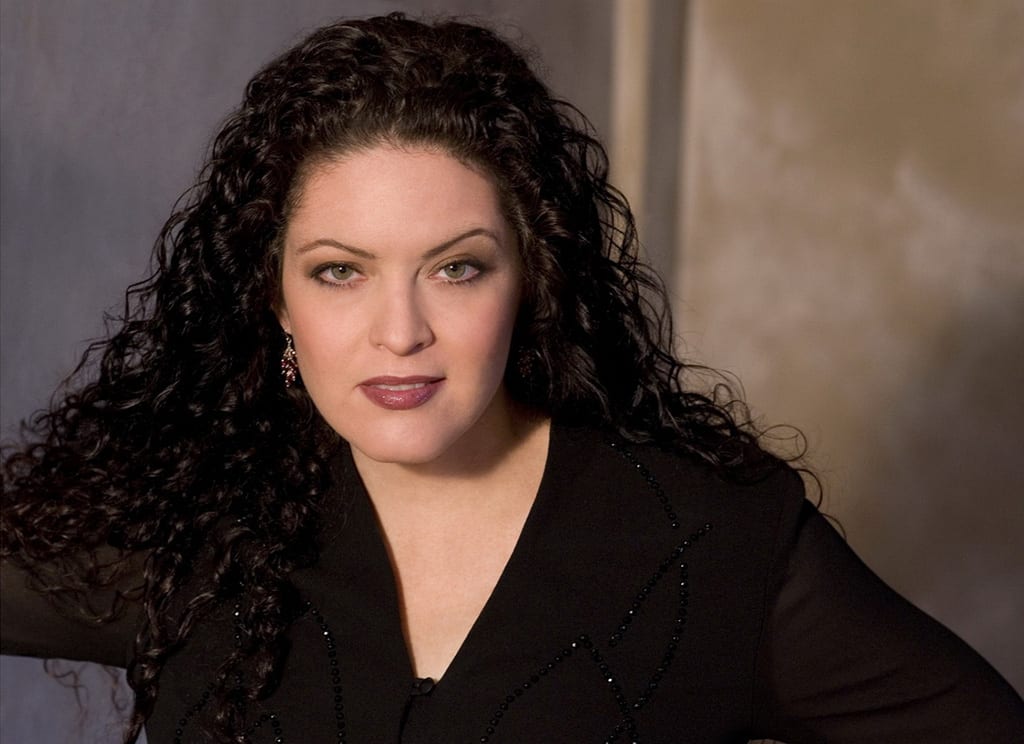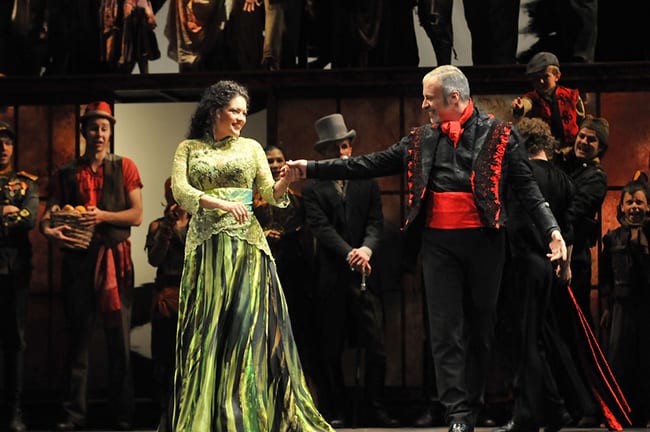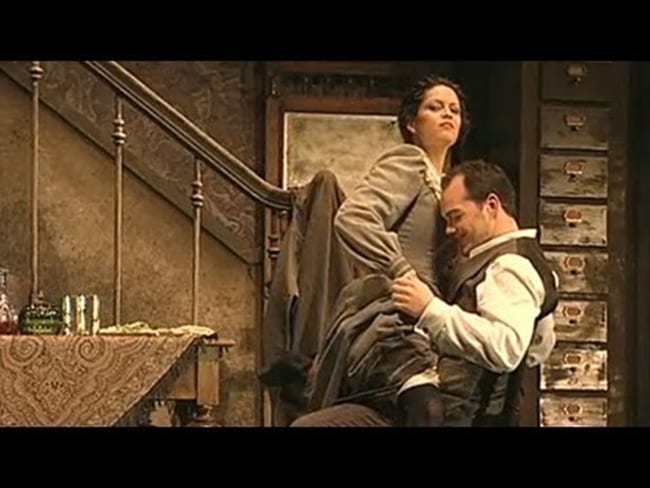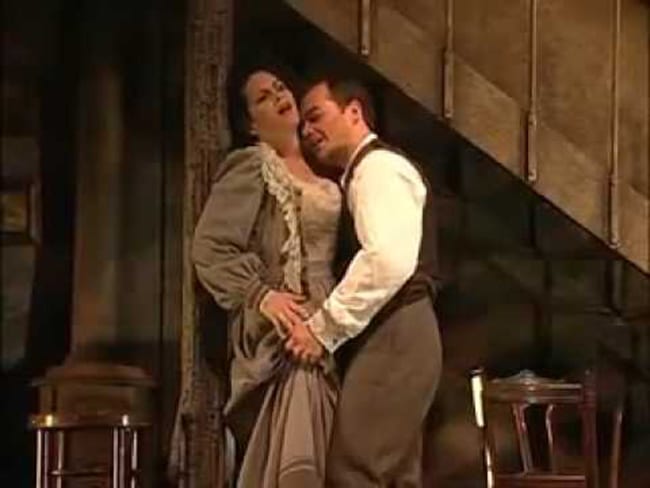Lucky London and Tunbridge Wells! They will be able to hear American mezzo-Soprano Kirstin Chávez live, accompanied by Italian pianist, Paolo André Gualdi, on June 15 and 19 respectively in their concept concert entitled A World of Love. This concert should be an excellent chance to get the measure of this team in a rich and varied range of material. Chavez relishes the chance of spending time in the UK and loves UK audiences. I spoke to her while she was having a well-earned rest for a few days in Dallas, Texas.
“Dallas has been home for about eleven years now,” she told me. “I live with my second parents. They kind of adopted me when I was about sixteen. About eleven years ago I was travelling so much for work that I couldn’t own a home or take care of it, and these wonderful people told me that, in that case, I had to come live with them and use their home as my base. It works extremely well for me.”
Kirstin Chávez has always had a peripatetic life, right from her earliest days. “I was brought up largely in Kuala Lumpur. My parents were both teachers. They started in New Mexico, which is where I was actually born – so yes, technically I could be President of the United States. When I was still very young my parents moved to Southern Colorado and taught at a college. But they were concerned about the racial stereotyping and foolishness they kept encountering. My mother is an Anglo, you see, from NewYork State; and my father is of Hispanic descent. So to the community they were in, they were a mixed race marriage. They encountered prejudice; and my brother began to be attracted by the Chicano gang movement. So my parents decided: let’s move. They had heard of a circuit of international schools and at that moment they badly needed English teachers like my mom and also music teachers like my dad. So my parents found this school in Kuala Lumpur where they could both get jobs and we were off.”
Her mother’s interest in literature has translated for Kirstin into her fascination with interpretation of characters, and hence an interest in acting. From her father she got her interest not just in music but also in opera. “My dad actually trained as an opera singer and even started a career as a tenor. But I guess he didn’t have quite the temperament or the personality traits that you need to pursue a career in opera. It’s a tough profession! But it happened that my dad also loved being a teacher and he was an expert particularly in Spanish American folk music. In his days as a singer he actually published some records in that field. He taught me to sing through this folk music. Also my parents were the co-director of all the musical theatre production at their school. My first time on a stage was as a beggar boy in the musical Oliver!”
“So essentially you set out to be an opera singer,” I suggested.
Kirstin laughed. “Actually I thought I would be a Broadway gal. Also, until quite a late stage I was of the belief that opera singers sound funny and that they are all fat. But one day when I was seventeen and was singing in some school event, someone said to me: You know, one day you could be a great Carmen. At that stage I actually had no idea what they were talking about. And lo and behold, they turn out to have been sooth sayers. Carmen is now one of my real bread and butter roles. Anyway, it was only when I went off to study music in college that I got exposed to opera.”
I asked Kirstin Chávez about her education, for which she returned to the USA. “I did my Bachelor of Music in New Mexico’s state university. I had gone back for a visit a year earlier and even got a driver’s licence; and so I qualified. Then I went to the Eastman School of Music in New York State for my masters. Eastman was a major shift for me, really provoked a lot of thought and soul searching. It has a huge sense of tradition and you feel you have to live up to that. Even when you use the bathroom you are aware that some famous person of the past used this very bathroom. Eastman was a great school in every way. I’m afraid I missed out a bit of the experience, though, because I was always busy with extra-curricular jobs to pay my way. I would be rushing off to work and pass people sitting quietly studying their scores and wish that I had the time to study and brood the way they did. I was at Eastman for three years and it really did give me a hugely important education.”
Kirstin went on to say that her only issue at Eastman was with some of the gaps in the training of opera singers that she feels are still ubiquitous. “Acting training is minimal. They only give you some opera workshop classes and you may do some scenes from this or that opera with you fellow students; but you never get any real acting training. I consider myself 50% an opera singer and 50% an actor. If singing has to be that good when you are in front of an audience then why not also train to be able to express the role with the rest of me and bring the acting and facial expressions and movement up to the same level as the singing. I do some work with young singers and I always, always insist on spending as much time thinking about the acting of the role and how it connects to the music as I do on the actual notes. As far as I’m concerned there can be no “park and bark” approach any more. These days we have to compete with movies and HD cameras; and I feel that we can’t bring in the audiences without that kind of commitment to the full art form.”
Another one of Kirstin’s worries for young singers is that they start living in the world or backstage politics, rehearsals and performances before they have had enough real life experience.
“While at Eastman I started work as a Finanicial Planner for Met Life. Admittedly it was just because I needed the income. I did it because I badly needed a job and that one simply came my way.” At this point, I reminded Kirstin that Luciano Pavarotti had worked very successfully as an insurance salesman in and around Modena when he was studying and that, indeed, he had been offered a promotion to be a regional manager just when he was also offered his first opera singing engagements; he had to choose between a secure job and a risky career in singing. I asked Kirstin how she ever wound up working in the financial industry.
“It was simply that I got a flyer in the mail. I answered it, got an interview, got an offer for the job and decided to try it. It paid better than waitressing and was more interesting too. Yes, there was a lot I hated about it because I am essentially not a sales person; but I loved counselling the clients, learning about their difficulties, figuring out ways to help them. I did something like twelve courses in my time and, by the end, indeed, I was only one exam away from a national certificate in financial advising. And to this day I am so grateful that that happened because I learned about money, investment, how to do my own stuff as a self employed person. Believe me, this is very important in my business. And I have to admit too that when I started out on the singing career full time, it gave me a boost because I felt I could always go back to it if I failed. Also, I really felt I was doing something valuable as a financial planner for people even when I was feeling at my lowest about the work. I was in Rochester NY and would go to see clients in winter storms. I remember once going to see some clients in a trailer park. They were really desperate and there was a snowstorm but I felt I just had to go and help them then and there. Of course I got stuck and had to call a tow truck to get my out of there. When the tow truck finally turned up hours later he said he couldn’t help me or he would get stuck too. All he could do was drive slowly and carefully into the blizzard and advise me to follow him and be sure to stay in his tracks!”
Because of her parallel career in finance, Kirstin only started her professional career as a singer when she was thirty. She got her degree from Eastman when she was 24 but she felt she had time and needed more life experience, hence working for over three years full time not as a singer. And once she started working as a singer for her living, she decided she had to learn her craft properly. She spent two years doing apprenticeships in Orlando, Florida in the days when Orlando had a rather fine opera company; and she spent a summer in Bravard North Carolina in what she called a “kind of music camp for grown ups! Santa Fe was the final summer job and it proved to be a superb springboard. I also considered coming over to Europe, but by the time I was offered a fest contract at Stuttgart, I was already doing a real career and found that I wasn’t willing to give up the engagements that were coming my way to be a fest. My first European contract was as Carmen in 2006 in Graz, just a lovely place to have started. But building the momentum in Europe isn’t easy. This past year I’ve been mainly singing in the USA, and that’s how my calendar is looking for the next season too. But two years ago I made my debut at the Royal Opera House, Covent Garden singing the Marquise de Merteuil in Luca Francesconi’s Quartett in the Linbury Studio Theatre. I also sang Carmen with the Welsh National Opera. Both were heaven. It was like coming home.”
The concerts in London and Tunbridge Wells, therefore, are to a large extent Kirstin’s own initiative. “I want to have a presence in the UK. We came from Malaysia for the home paid leaves nearly every year and I saw many beautiful things. I’ve come to love the UK very much. Singing at the Royal Opera House was a huge, personal milestone for me; and singing in Cardiff was a dream come true. I’m very close to Kate Herbert who used to work at the Royal Opera and who is now a freelance producer. So I asked her about a year ago if she could produce this concert for me. She guided me on every aspect of the planning.”
Kirtin said that another personal milestone for her this year was singing Carmen in the Diamond Horseshoe in New York, which was specifically built for interactive theatre. It can accommodate an audience of only about three hundred. “And it was full to the brim! It was an extraordinary way to do an opera! You have such contact with the audience! I also did a concert on March 16 that inaugurated the New York City Opera Concert series. Every singer who ever sang at the New York City Opera is heartbroken that it failed and we are all rooting for it to be resurrected. I also sang in the Mozart Coronation Mass on Easter Sunday in Carnegie Hall. Those were three wonderful connections to make in New York.”
Coming up are concerts in Strasbourg. Kirstin says that concerts and recitals are becoming more and more important to her.
“When I do operas I love the work itself but I’m very removed from my audience, After all, there is, at the very least, an orchestra pit and a full orchestra between us. When I do concerts, I feel in and amongst my audience and I can sing up close and personal. I can even enter through the audience or go down into the audience. And I can see how it touches people. Concerts and recitals are among my most favourite things in life. It means I can give a gift directly into people’s hearts. For a couple of hours, for a unique audience gathered for just this one time, I can make the world a better place for them, a place of hope and optimism and a reminder of how art can enhance life and even make it more meaningful and positive. I guess that’s why I love doing lieder, because it’s so intimate. When you sing opera you have to make a certain decibel of noise in hope of being heard over the orchestra and at the back of the house. Sometimes you just have to stick your face into the auditorium and open up as loud as you can! As you become more skilful you learn how to do that and share intimacies. Even so, when you do it with lieder the possibilities of intimacy and of nuance are so much more vast – the colours are more subtle and the palate is much wider that you can use. Sadly, at this time, in the USA, song recitals are far too rare; I don’t know if it’s just that the whole taste for them is dying out or if it’s largely to do with finances, but you don’t get the opportunities unless you are crazy famous.”
I asked her if she got to see her parents very often these days with all her travelling and work. “Sadly, my father passed away eight years ago. He was 47 when I was born. Mother was 15 years younger. Presently she lives in Ocean Springs, Mississippi. They were in Hurricane Katrina when it happened and I couldn’t get through to them for three days. Every hurricane season I hold my breath. I see my mom as often as I can. I wish she lived somewhere else but she’s happy there. We share a dog. I rescued it from a shelter in San Antonio two years ago. Holly is a mix of dachshund, terrier and poodle. She has an amazing personality.”
I asked Kirstin if there were any roles that were particular favourites or that she was eager to do in the future. “Any strong role with a mezzo range, that’s what I want to do. But I also loved doing some music theatre recently. I got to play Aldonza in Man of La Mancha in New Mexico and I am dying to do that one again.”
Before she had to go, Kirstin wanted to highlight her accompanist. He is from Rome but, as she says, the Fates decided to play a joke and he has ended up teaching and living in Florence, only in South Carolina, at the Francis Marion University. “He’s an incredibly gifted musician. To make money in the early days, his first professional engagements were as a lounge player, so he not only knows the classical repertoire but also jazz. For me his best repertoire is Liszt. He’s really a solo pianist but he has a unique ability to accompany and also to shift styles.”
Kirstin is also well known for her commitment to recent and contemporary music. Her contemporary American opera credits include: Sharon Falconer in Robert Aldridge’s Elmer Gantry, Sister Helen Prejean in Jake Heggie’s Dead Man Walking for Tulsa Opera, Jo in Mark Adamo’s Little Women for Opera Pacific and two roles in operas by Tobias Picker, Thérèse in Thérèse Raquin in San Diego and Sondra Finchley in An American Tragedy for her debut at the Metropolitan Opera in New York. You can hear her in excerpts from operas on You Tube. But more importantly, if you can get there, you can hear her at the Cadogan Hall in London on 15 June and in the Assembly Hall Theatre of Tunbridge Wells on June 19 singing about a world of love.














